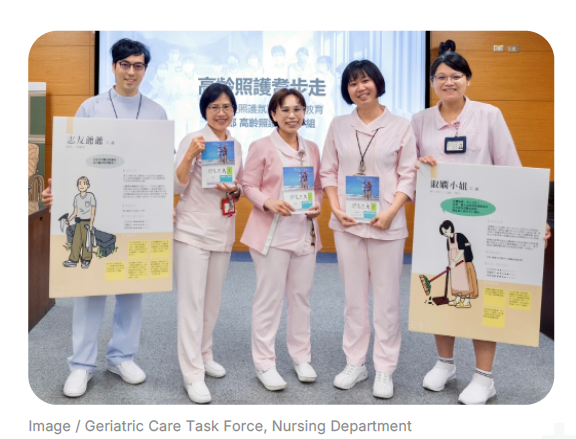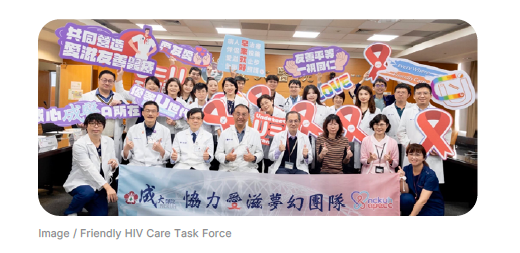Holistic Care Training
Holistic Care Training
-
Practicing Humanities and Social Care
The Teaching Center continues to serve as the core driver of medical education. Each year, over 2,700 individuals complete clinical medical education internships, and training is provided to various categories of healthcare personnel, with more than 30,000 on-the-job education and training sessions annually.
The training content for each professional category is formulated in line with the Hospital’s short-, mid-, and long-term development plans and the trends in medical development. Training outcomes are regularly reviewed and submitted to the Medical Education Committee for evaluation. Every effort is made to uphold the Hospital’s core values of “Life, Love, Excellence, Innovation,” promote a “patient-centered” culture, cultivate healthcare professionals with both humanistic literacy and professional competence, and ultimately create an environment of holistic medical care.
-
Palliative Care, Geriatric Nursing, and HIV Team
With Taiwan’s rapidly aging population expected to enter a super-aged society by 2025, the demand for elderly care continues to grow. The Nursing Department of NCKU Hospital has long established a Geriatric Care Task Force and developed an advanced geriatric care system to help nurses become experts in elder care. Nurses are trained to begin with empathy and think from the elderly's perspective, addressing their needs from hospitalization through discharge. This training model will also be extended to affiliated hospitals co-managed with the Ministry of Health and Welfare, such as Tainan Hospital, to build a locally rooted, age-friendly care network.
The Geriatric Care Task Force incorporates the concept of service design in its training. In the first phase, they create elderly personas by compiling and summarizing common characteristics of elderly patients in care settings, developing several semi-fictional prototype cases to help nurses understand diverse elderly profiles. The second phase integrates standardized patients based on the personas’ background and scenarios. Through interactive workshops, nurses engage in conversations, assessments, and care planning to learn how to identify the core needs of elderly patients.
Geriatric Care Task Force, Nursing Department

Geriatric Care Task Force, Nursing Department
Traditionally, the emergency department has been viewed as a setting primarily focused on diagnosing and treating acute illnesses and trauma, not a preferred site for palliative care. However, in response to the increasing demand for emergency and palliative medical services for the elderly, the Emergency Department of NCKU Hospital began offering palliative care in 2017. In 2022, a dedicated emergency palliative care room (Room R88, single-bed ward) was established to provide a private space that accommodates family presence. The service integrates interdisciplinary team resources, including inpatient and home hospice care teams, pharmacists, psychologists, social workers, and chaplains, to offer joint consultation and care services to emergency patients and their families in need of palliative care.
In the future, the Emergency Department will develop various assessment methods and forms based on patients’ palliative care needs. These tools aim to detect physical, psychological, and spiritual issues early—caused by illness or trauma—from a palliative care perspective, enabling comprehensive evaluation and appropriate interventions to prevent and alleviate suffering while improving patients’ quality of life.
The Hospital has also been committed to providing comprehensive, high-quality care for individuals living with HIV, striving to eliminate discrimination and break stigmas to ensure patients receive equal and respectful services across departments. According to internal surveys, 92% of medical staff provide nondiscriminatory care, 88% are willing to care for patients with HIV themselves or with colleagues, and 96% agree the hospital offers sufficient protective measures to reduce infection risk among healthcare workers.
In late 2024, a “Friendly HIV Care Task Force” will be established to formulate a cross-disciplinary HIV-friendly care initiative, aiming to build a more secure and stigma-free medical environment.
Friendly HIV Care Task Force


-
Interprofessional Collaboration
With the advancement of medical technology and the increasing complexity of health issues, a single medical profession can no longer fully address the overall needs of patients. Therefore, through interprofessional team collaboration, a patient-centered integrated care model is established. This not only enhances medical quality and safety but also reduces redundant treatments, shortens hospital stays, and strengthens the patient care experience and health outcomes.
To promote team collaboration skills, the Teaching Center has introduced the Healthcare Matrix tool into its training, emphasizing a positive learning environment focused on systemic and team-based improvement, and guiding healthcare professionals from diverse backgrounds to engage in comprehensive dialogue.
Through the Healthcare Matrix, teams can examine critical aspects of patient care from multiple perspectives—such as communication, teamwork, patient engagement, clinical judgment, and systemic errors—which are core components of patient safety. Based on each case, a holistic analysis and reflection are conducted on each aspect, discussing whether any issues occurred during the care process, identifying their root causes, and exploring possible improvement strategies.
Innovative Teaching and Continuous Improvement
-
Needs Assessment and Implementation
NCKU Hospital continues to implement various smart technologies to enhance care quality. For example, since 2022, the hospice home care team has adopted a smart hospice care service platform, enabling medical personnel to remotely monitor patients’ physiological status and arrange home visits or provide remote assistance to family members when needed. From the end of 2023, the hospice ward has used Hui Jia Smart Mattresses that issue alerts when terminal patients exhibit abnormal breathing, prompting nurses to visit the ward immediately to provide end-of-life care.
Teaching activities for each professional category are planned, reviewed, promoted, coordinated, and evaluated by the teaching program leader or course coordinator. Reviews and revisions of teaching plans, courses, and evaluation methods are conducted regularly (monthly or quarterly) in teaching meetings based on hospital goals and feedback from instructors and trainees. Quarterly, representatives attend the Medical Education Committee and the Teaching Task Force Meeting of the Teaching Center for reporting and follow-up on teaching implementation.
To encourage each professional category to revise and improve their teaching programs using the PDCA method, the Hospital has established the “Teaching Improvement PDCA Incentive” policy. Annual incentive competitions are held to promote continuous improvement and enhancement of clinical teaching quality, thereby achieving mutual learning benefits across professions.
-
Learning Effectiveness Evaluation
The Hospital has established corresponding evaluation mechanisms for training across all professional categories, including assessments of training outcomes and teaching effectiveness. Trainees can view their individual training plans, various assessment results, and teacher feedback through the “NCKU Hospital e-Learning Portfolio” system. This system periodically sends email reminders to instructors for conducting evaluations and revises teaching plans based on student feedback. It also simplifies cumbersome administrative procedures, allowing instructors to focus on teaching and helping learners grow. This, in turn, enhances professional competencies across all categories and improves the quality of patient care.
To ensure that healthcare professionals possess essential competencies in critical thinking, clinical problem analysis, literature search, and evidence-based application for medical decision-making, NCKU Hospital regularly offers applied courses to strengthen evidence-based thinking and actively engages in related research and competitions. In 2024, a total of 7 evidence-related papers were produced. In the 25th National Healthcare Quality Award competition under the Evidence-Based Medicine category, the Clinical Literature Search Group won the Gold Award, Honorable Mention, and Merit Award, while the Novice Group received the Silver Award, Bronze Award, and Honorable Mention.
Furthermore, the Hospital’s teaching activities go beyond practical training, transforming research design and data analysis into academically valuable knowledge outputs that align with trends in medical education both domestically and internationally. In 2024, the Teaching Center presented 17 papers at the Taiwan Association of Medical Education and 7 papers at the AMEE European Medical Education Conference. Additionally, 1 paper was published in a medical education journal, demonstrating the Hospital’s continued dedication and contribution to medical education and academic research.v




